 PO
Box 9021, Wilmington, DE 19809, USA
PO
Box 9021, Wilmington, DE 19809, USAE-mail: font@focusonnature.com
Phone: Toll-free in USA 1-888-721-3555
or 302/529-1876
Website: www.focusonnature.com
 PO
Box 9021, Wilmington, DE 19809, USA
PO
Box 9021, Wilmington, DE 19809, USA
E-mail: font@focusonnature.com
Phone: Toll-free in USA 1-888-721-3555
or 302/529-1876
Website: www.focusonnature.com
CHILE BIRDS
IN THE
POEMS
OF
PABLO NERUDA
WITH PHOTOS
A Focus on Nature Tours
Special Feature
compiled by Armas Hill
Pablo Neruda, who
lived from 1904 to 1973,
was a Chilean poet,
and his poems here
are
about the birds in his country,
with the exception of the last one,
about the Dodo.
His writings were extensive, and he received
the Nobel Prize for Literature in 1971.
Most of the photographs that follow were taken during FONT tours,
and most were taken during tours in Chile.
Links:
Upcoming
FONT Birding & Nature Tours in Chile
Birds
& Other Wildlife during the November 2011 FONT Tour in Chile
A Narrative relating to the November
2011 FONT Tour in Chile
A
Complete List of Chile Birds & a Photo Gallery, in 2 parts:
Part
1: Tinamous to Coots Part 2: Thick-knee to Saltator
Directory of Photos in this Website
Following here are the poems and the accompanying pictures. The text in this
feature is in English.
The poems were originally written in Spanish.
All of these poems, in both Spanish and English, with color illustrations are in
the book
entitled "Arte de Pajaros" or "Art of Birds", published in 2002.
The translations from Spanish to English are by Jack Schmitt.
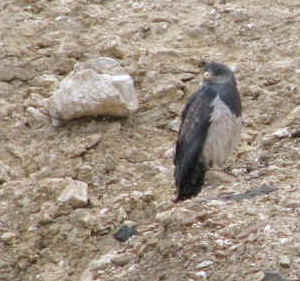
An adult Black-chested Buzzard-Eagle
during the FONT tour in Chile in November 2011
(photo by Frank Stermitz)
Black-chested
Buzzard-Eagle
Geranoaetus
melanoleucus australis
Bitter bird, cold eagle,
sword of the cordilleras,
motionless in your eternity,
in the indifferent years,
in the stone of agony.
Harsh-plumed eagle,
I know your black language,
your cyclones' menace,
your bloodthirsty transparency,
your death-stained talons,
and I know you return defeated
to your mountains of stone and snow,
to the Andes' great silence,
to the tower of thorns.
The rose kept flowering,
the spring again spoke
its crystal conversation:
the new nests were filled
by springtime's command,
the hare stretched out on the moss
to give birth at twilight:
the clarity of the moon, of the stars,
flowed like rivers in an estuary
and you there alone, awake,
not being born or flowering -
alone with the night.
![]()
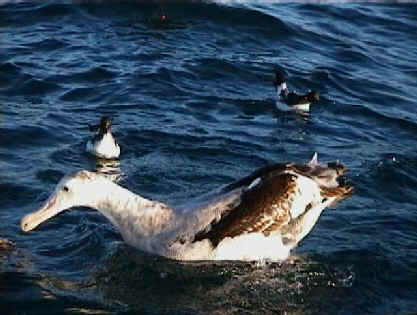
A Wandering Albatross during a FONT tour
Wandering Albatross
Diomedea
exulans
The wind sails the open sea
steered by the albatross
that glides, falls, dances, climbs,
hangs motionless in the fading light,
touches the waves' towers,
settles down in
the disorderly element's
seething mortar
while the salt crowns it with laurels
and the furious foam hisses,
skims the waves
with its great symphonic wings,
leaving above the tempest
a book that flies on forever:
the statue of the wind.
![]()
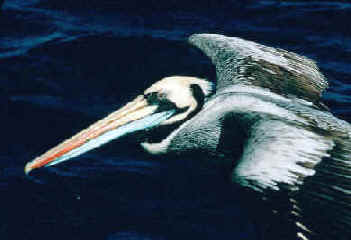
A Peruvian Pelican during a FONT tour in Chile
(photo by Harold Lebo)
Peruvian Pelican
Pelecanus thagus
Seated upon the sea the pelican
ponders profound problems
the ocean's capacity
to provide nourishment,
the repetition of waves,
the whale's solitude,
the moon's sorceries,
the wind's coordinates.
Impassive judge of the sea:
time rolls over its skull
and a drop of wave or rain
runs down its long nose
like a transparent dictum.
Rocked by the surf like a nest
or an abandoned cradle,
the pelican measures
the consumed fish that accumulate,
like plastic money, in the purse
hanging from its mandible.
School of sardines,
pale autumn fish,
smooth hake from Taitao,
knife-colored yellowjacks,
even phosphorescent mollusks,
tentacles, satanic squid, and
urticarial cephalopods are stashed
in the pelican's purse.
Suddenly the miser lifts
its fish-laden pouch,
extends two lead wings,
the iron plumage takes to the air
and cruises the silence in silence
like a sacred ship.
![]()
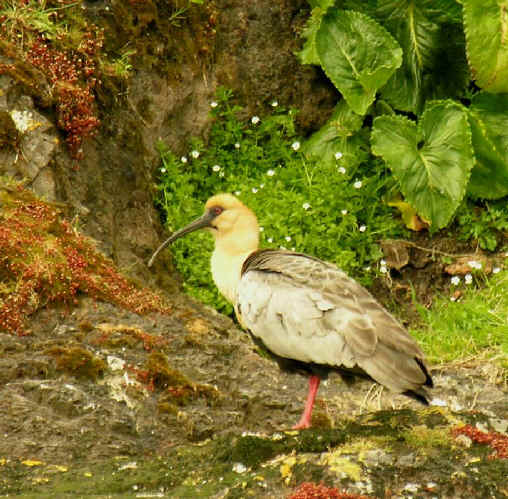
A Black-faced Ibis during the FONT tour
in Chile in November 2011
(photo by Frank Stermitz)
Black-faced Ibis
Theristicus
melanopis
I know the fluvial waters,
and from so much loving water and soil
the forest's secret sounds
have become such a part of me
that I sometimes go walking
with so many birds,
with such a silence of
bursting roots and seeds,
that when I fall asleep I keep
reliving that sonorous silence,
but I awaken or am awakened by
the large, languorous black-faced ibis
that lingered in my dream
with their aluminum trumpets.
From Ranco to Lake Maihue
and the meadows of Llanquihue
the regiments of metallic ibis
travel in formation:
suddenly they entered my dream
like a flight of white furniture:
wings beating in slow motion,
somnambulistic southern love,
pungent rainforest aroma,
feet sinking in leaves,
lakes like opened eyes
penetrating the foliage,
smell of fallen cinnamon laurel,
smell of time and moisture.
I awakened in the middle of the street:
the birds from the Far South flew on,
ringing out in the wind.
![]()
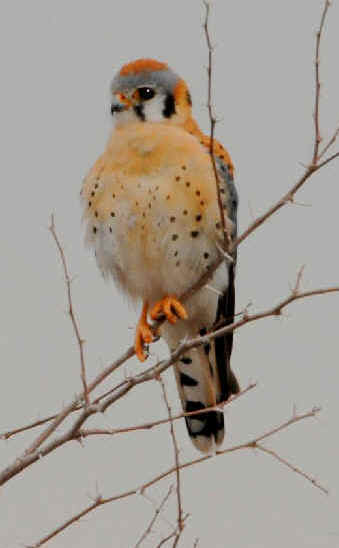
An male American Kestrel
(photo by Howard Eskin)
American Kestrel
Falco sparverius
High noon opened up:
the sun in the center, crowned.
The earth awaited indecisively
some movement in the sky
and everyone remained
indecipherably still.
At that slender second
the hawk hammered its flight,
cut loose from the firmament,
and swooped like a sudden shiver.
The landscape remained serene
and the woodlands were not
frightened,
the volcanoes were still aloof,
the river kept proclaiming
its abrupt and wet lineage:
everything kept throbbing
in that green-pattered pause
except a hare, a bird,
something that flew or ran,
something that used to live
on that blood-splattered spot.
![]()
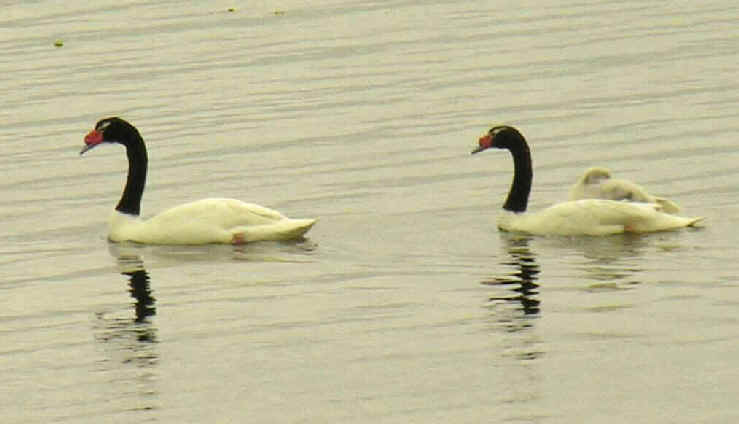
Black-necked Swans during the FONT tour
in Chile in November 2011
(photo by Frank Stermitz)
Black-necked
Swan
Cygnus
melanocorypha
Above the swimming snow
a long black question.
![]()
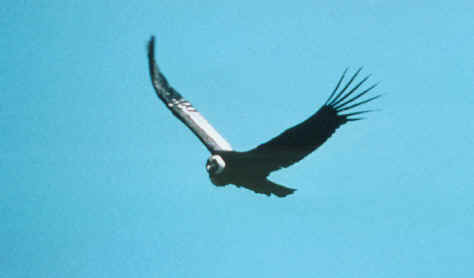
An Andean Condor photographed during the first FONT tour
in Chile in November 1990
(photo by Alan Brady)
Andean
Condor
Vultur gryphus
In its iron coffin it dwells
among the rusty stones
feeding on horseshoes.
In the mountains the north wind
whistles and howls like a missile
and the condor leaves its casket,
sharpens its talons on the rocks,
spreads it mystical plumage,
flies to the end of the sky,
gallops the concave heights
with its iron wings,
and pecks at the sky's zinc,
waiting for a sign of blood:
a motionless speck,
the heartbeat that prepares
to die and be devoured.
The black cyclone planes down
and falls like a cruel fist:
death waited down below.
Above, cruel cordilleras,
like bloodstained cacti,
and the bitter-colored sky.
It soars back to its dwelling,
folds its imperious wings
and again stretches out to sleep
in its abominable coffin.
![]()
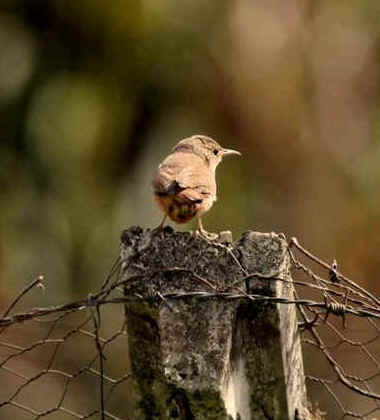
A Southern House Wren during a FONT tour
(photo by Marie Gardner)
Southern House Wren
Troglodytes
aedon
Little round neighbor, all
dressed up in feathered finery,
always after your treasure:
hunting for a stray atom,
a notion, a filament,
a trifle in the brambles,
an eyelid in the underbrush:
something surely there because
a wren turns upside down and inside out:
its agile eyes sparkle,
its tiny tail cocked
straight towards the clouds,
it comes and goes and then returns,
suddenly chirps, vanishes from sight
until it explodes again
from its feathered-colored nest,
leaving behind its minute eggs,
round little works of wonder
from which a wren's curiosity
will eventually pop out
to investigate springtime.
![]()
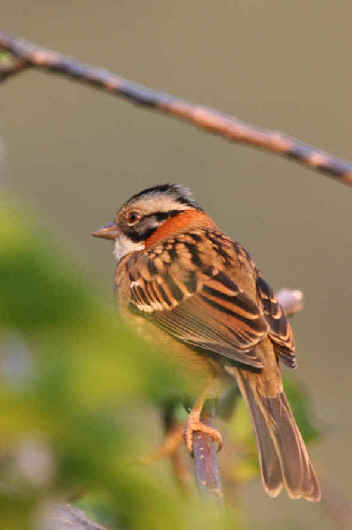
A Rufous-collared Sparrow during a FONT tour
(photo by Marie Gardner)
Rufous-collared
Sparrow
Zonotrichia
capensis
You awakened me yesterday, friend,
and I went out to meet you:
the universe smelled of clover,
of a star opened in the dew:
who are you, and why were you singing
so intimately sonorous,
so uselessly precise?
why did the fountain flow
with your trill's precision,
a drop of water's clock
your fragment little violin
questioning the plums,
the indifferent headspring,
the color of lizards,
asking pure questions
that no one can answer?
i had no sooner seen you, passerby,
minuscule musician, fresh
daybreak's tenor, proprietor
of morning purity, than I
understood you were bringing back
with your little water flute
so many things that had died:
so many petals buried
beneath the smokestacks,
the smog, and the pavement.
Your crystal performance
brings us back to the dew.
![]()
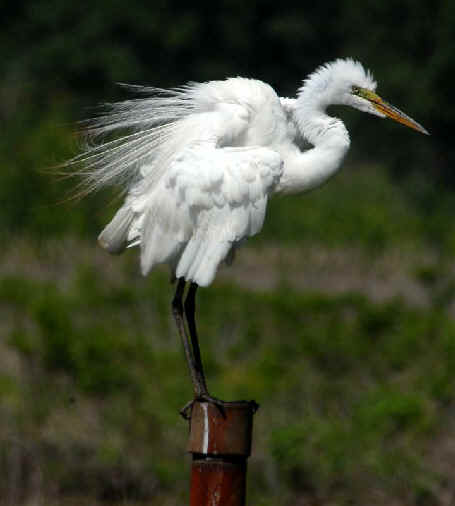
A Great Egret
(photo by Howard Eskin)
Great Egret
Egretta alba
The motionless snow has two
long legs in the lagoon,
the white silk has one
body of fishing snow.
Why is it so immersed in thought?
Why on just one leg
does it wait for a snowy spouse?
Why does it sleep standing in the water?
Does it sleep with its eyes open?
When does it shut its white eyes?
Why in the devil is your name egret?
![]()
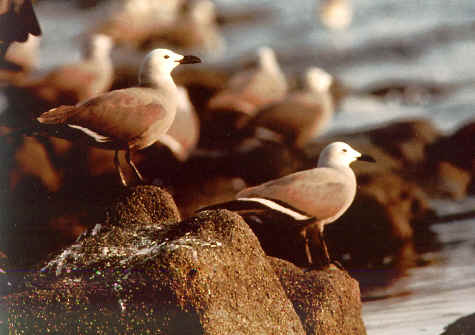
Gray Gulls during a FONT tour in Chile
(photo by Harold Lebo)
Gray Gull
Larus modestus
The gull adroitly opened,
in seafoam and stupor.
two wandering pointers,
kept stationary with
two wings stretched out in the sky,
two shining secretaries of the light,
until it flew off, however,
to the east and to the west,
to the north and to the snow,
to the Moon and to the Sun.
![]()
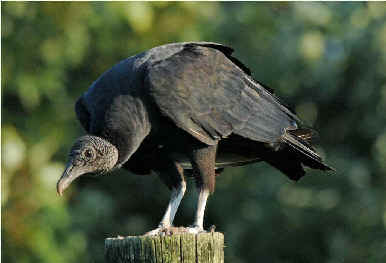
Black Vulture
(photo by Howard Eskin)
Black Vulture
Coragypus atratus
The vulture opened its Parish,
endorsed its black habits,
flew about in search of sinners,
diminutive crimes, robberies,
lamentable cattle thefts,
inspecting everything from above:
fields, homes, dogs, sand,
it sees everything without looking,
flies outstretched, opening
its priestly garb to the sun.
The vulture, God's spy,
does not smile at springtime:
it circles round and round, measuring heaven,
solemnly settles on the ground,
and folds up like an umbrella.
![]()
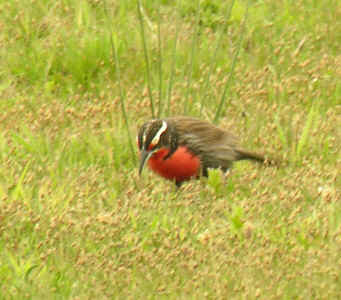
A Long-tailed Meadowlark
during the FONT tour in Chile in November 2011
(photo by Frank Stermitz)
Long-tailed
Meadowlark
Sturnella militaris
Why show me every day
your bloody heart?
What crime is on your chest,
what indelible kiss of blood,
what hunter's shot?
Why do your rush and search and burn
with that bright red breast,
looking without haste and without fear,
looking at man with your eyes?
If you're looking for a judge,
why do you slip away
with cold eyes and abrupt wings
to another signpost where
your heart glitters again
in the bloody sun?
![]()
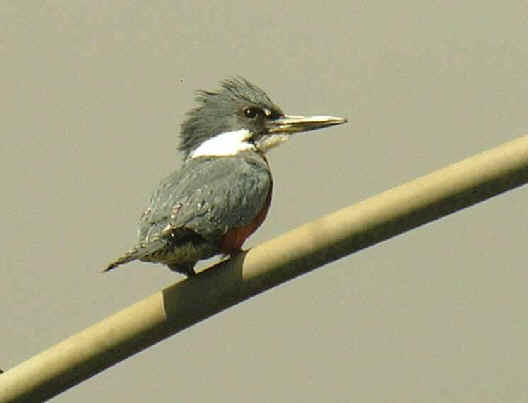
A Ringed Kingfisher during the FONT tour in Chile in November
(photo by Frank Stermitz)
Ringed Kingfisher
Megaceryle torquata
King looked from its branch
and Fisher submerged,
Kingfisher dove down
and Kingfisher fished,
King dove down, poor bird,
and Fisher surfaced rich
with its load of live silver
and some blue drops of water,
because the fisher King
feeds only on rainbows,
on light rippling in the water:
then sits down and consumes
its catch of quivering fish.
![]()
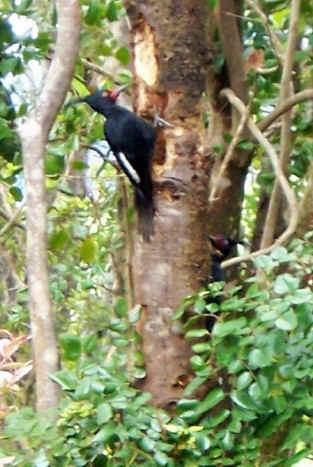
A female Magellanic Woodpecker
during the FONT Chile Tour in December 2009
on Chiloe Island
(photo by Robert Hinz)
Magellanic Woodpecker
Campephilus
magellanicus
The woodpecker toco toc:
under the sun the forests distill
water, resin, night, honey,
the hazelnut trees don
gallons of scarlet pomp:
the burned logs bleed on,
the foxes of Boroa are asleep,
the leaves grow silently
while the roots' language
circulates beneath the ground;
suddenly in the green silence
the woodpecker toco toc.
![]()
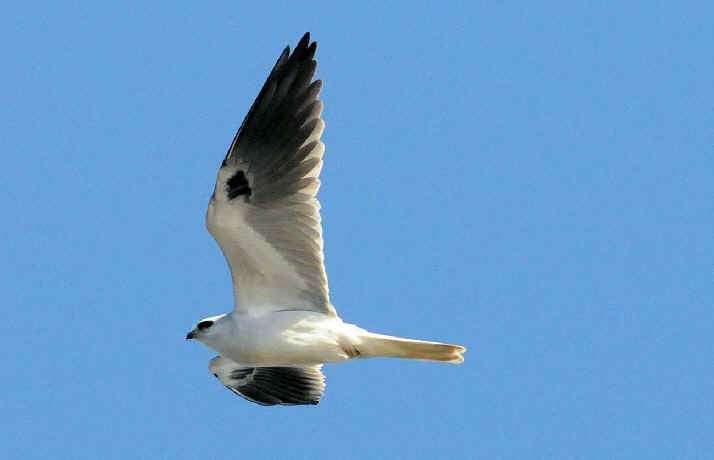
A White-tailed Kite
(photo by Howard Eskin)
White-tailed Kite
Elanus leucurus
I saw the white falcon suspended
from the sky as if by a thread,
but there was no thread:
the white falcon fluttered.
The movement was snowy,
its great white wings flapped,
inside it the fire leapt
like a consuming bonfire:
hunger sharpened the steel,
the black cyclone of its talons:
it prepared the blind blood
to plunge lie a stone:
terror terror its snowy light,
terror its ravenous peace.
![]()
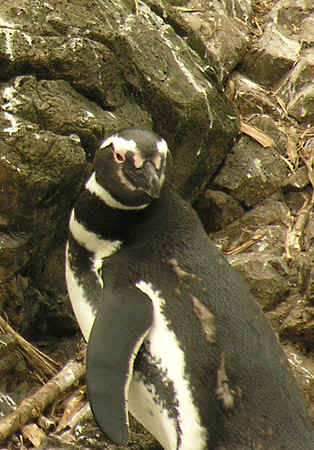
A Magellanic Penguin on Chiloe
Island
during the FONT Chile Tour in November 2011
(photo by Frank Stermitz)
Magellanic Penguin
Spheniscus
magellanicus
Neither clown nor child nor black
nor white but vertical
and a questioning innocence
dressed in night and snow.
The mother smiles at the sailor,
the fisherman at the astronaut,
but the child child does not smile
when he looks at the bird child,
and from the disorderly ocean
the immaculate passenger
emerges in snowy mourning.
I was without doubt the child bird
there in the cold archipelagoes
when it looked at me with its eyes,
with its ancient ocean eyes:
it had neither arms nor wings
but hard little oars
on its sides:
it was as old as the salt,
the age of moving water,
and it looked at me from its age
since then I know I do not exist,
I am a worm in the sand.
The reasons for my respect
remained in the sand:
that religious bird
did not need to fly,
did not need to sing,
and though its form was visible
its wild soul bled salt
as if a vein from the bitter sea
had been broken.
Penguin, static traveler,
deliberate priest of the cold,
I salute your vertical salt
and envy your plumbed pride.
![]()
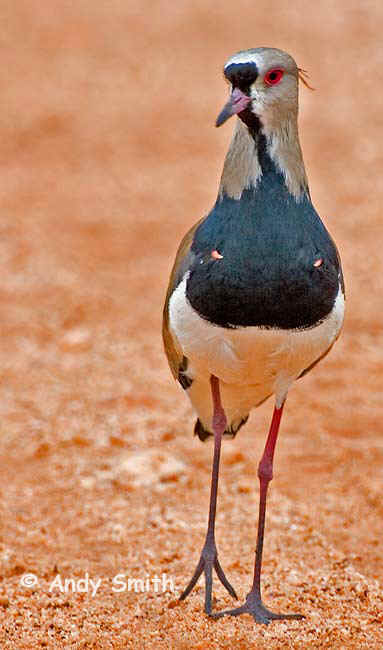
A Southern Lapwing during a FONT tour
(photo by Andy Smith)
Southern Lapwing
Vanellus chilensis
The lapwing flew off flashing
white snow and black snow
and opened its suit
in broad daylight,
in broad morning silver:
its nuptial wings' fan was priceless:
precious the body adorned
by the morning and the plumage.
The velvety bird's
wild extravagance shone
upon the stones of Isla Negra
and I thought: where is it going?
What celestial reception?
What golden water wedding?
What salon of pure purple
among columns of hyacinths,
where only the well-dressed clouds
may accompany it?
Well, I said, perhaps its going
to crown the tresses
of Pedro Espinosa's friend,
the naiad of the River Genil.
The diviner did no such thing:
it planed down to land
among clumps of stuble
in a fallow wheat field,
and there it launched its language,
its piercing tero tero,
while it pecked, picked,
and dispassionately devoured
a simple earthworm.
![]()
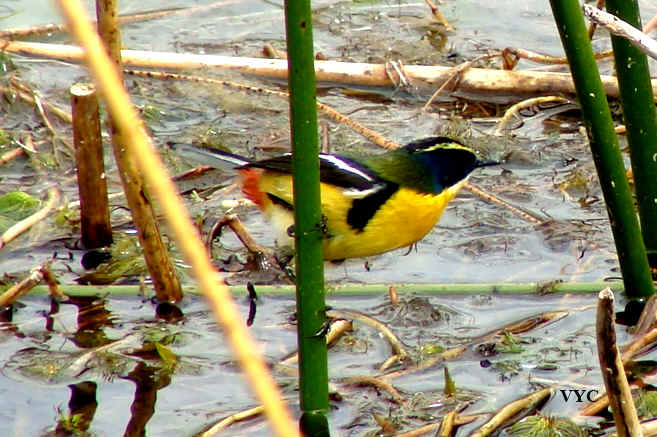
A Many-colored Rush-Tyrant in a Reedbed
Many-colored
Rush-Tyrant
Tachuris
rubrigastra
In the lagoon the cattail,
the wet reedbed,
some drops alive and aflame:
suddenly a movement,
a minuscule banner,
a scale of the rainbow:
the sun swiftly set it afire.
How were its seven colors combined?
How did it assume all the light?
There it was but was not:
the gust of wind is gone,
perhaps does not exist,
but the cattail is still quivering.
![]()
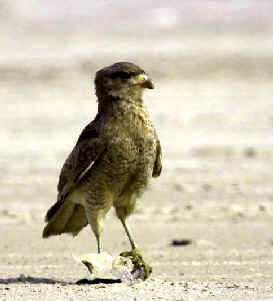
A Chimango Caracara during a FONT tour
(photo by Marie Gardner)
Chimango Caracara
Milvago chimango
Unacceptable, necessary,
insolent bird, inspector
embalmed before death,
dry caracara, feather duster,
caracara waiting for the funeral,
caracara indecisive in the rubbish,
impartial, conspicuous,
old skyhorse,
torn pants on a tile roof,
dilapidated flier,
pile of irritating feathers,
clothes hanger rusted in the urine
of an abandoned village,
beneficent caracara fallen
and raised from the dirt,
soiled by clouds of dust
until your will became faded out:
from so much scavenging about
you have no more color
than a cluster without grapes,
than a bean skin,
than hospital hair,
than buried feathers.
![]()
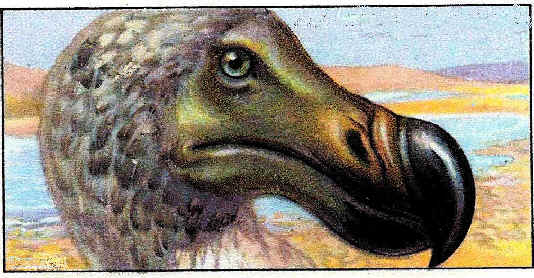
The bird that
was known as the Dodo
Dodobird
figuratively here,
Autoritarius miliformis
scientifically, Raphus cucullatus
The dodobird, seated,
sensed that it didn't know it,
that it didn't fly and didn't fly,
but gave out flight orders
and kept explaining wing by wing
what would happen in the atmosphere:
it made pronouncements about feathers,
revealed the sky and its currents.
The dodobird was born seated.
This sad featherless bird
grew up seated and never had
wings or song or flight.
But the dictator dictated.
It dictated the air, hope,
the sums of coming and going.
And if the matter at hand was lofty,
the dodobird was born above,
it pointed out the skyways,
it would ascend sometime,
but it was now concerned
with numbers, proprieties,
best not fly now:
"Meanwhile, you may fly."
The ferocious dodobird
sits down on it fangs
and spies on others flying:
"Not one bee will fly here
unless I so decree."
And thus the dodobird flies
but does not fly from its chair.
![]()